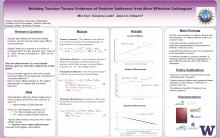Click image to see poster.
Abstract
Objectives: An emerging body of research suggests that student achievement is a function not just of one’s own classroom teacher but of the combined effort of the classroom teacher and others with whom he or she works. Despite this initial evidence, our understanding of teacher peer effects lacks clarity and detail. Failure to recognize the format of spillovers among teachers may lead school leaders to miss an important opportunity to strategically build teacher teams in ways that augment students’ math learning. In this study, we use the cases when teacher transfers enter an existing teacher teams and examine whether a transfer teacher’s entry into a grade-level team affects the achievement of students of incumbent teachers, and how these effects depend on the relative effectiveness of transfer and incumbent teachers.
Theoretical Framework: We use insights from the economic literature on employee peer effects in other workplaces, which emphasize the roles of social pressure and knowledge spillover as means for employees to affect the productivity of one another. We hypothesize four different potential types of spillovers. First, we look at the average spillover effects of new transfer teachers. This “linear-in-means” model assumes that with the arrival of an effective peer, all incumbent teachers will improve, and conversely, the arrival of an ineffective peer will hurt all others. We then consider the non-linearity of spillover effects depending on the difference in prior stable effectiveness between new transfers and incumbent teachers—the “relatively effective” where the new peer is more effective than they are; and “relatively ineffective” models where the new transfer is less effective. Finally, we use “absolute effectiveness” model evaluates which types of teachers are more or less responsive to peers’ effectiveness overall.
Data and Methods: Our data come from Miami-Dade County Public Schools from 2003-04 through 2012-13. We focus on math teachers in 3-8 grades, who can be linked to students for whom we have state standardized test scores in math. The data cover about 1.15 million student-year observations. We use econometric models with school-grade or school-year fixed effects.
Results: We find stronger evidence of positive spillover effects associated with the introduction of relatively effective peers into a teacher group. If a student has a new peer teacher at the same grade level who is about one standard deviation more effective than that of his or her own teacher, this student would have a 1.9 or 2.8 percent of a standard deviation increase in math test scores. We also find that incumbent teachers’ students are not meaningfully disadvantaged by the presence of relatively ineffective peer teacher. This finding implies that mixing teachers with diverse performance levels on grade-level teams may be a useful assignment strategy for increasing student achievement.
Significance: This study adds important empirical evidence to the emerging literature on teacher learning. The results also imply that talent management policies can utilize the importance of colleagues – and particularly the importance of access to skilled and effective teachers for teachers who are struggling in their classrooms – for the benefit of students.
